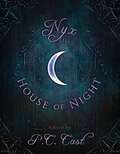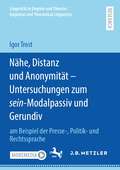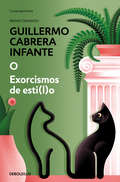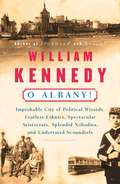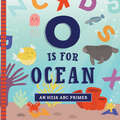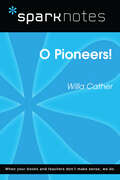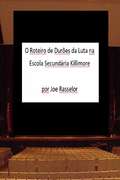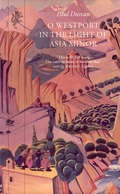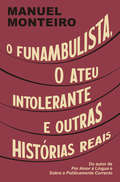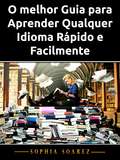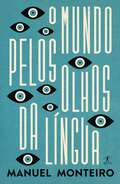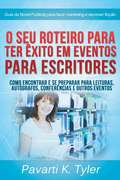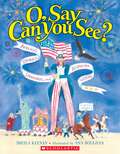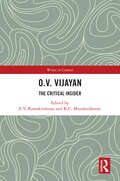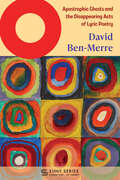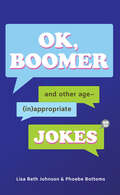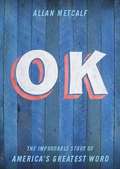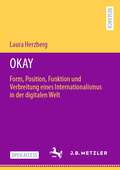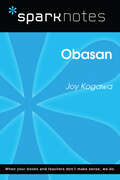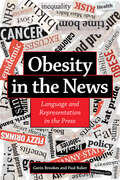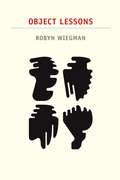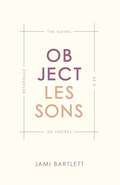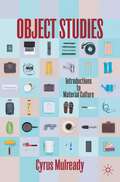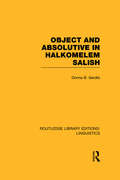- Table View
- List View
Nyx in the House of Night: Mythology, Folklore and Religion in the PC and Kristin Cast Vampyre Series
by Jordan Dane Kristin CastThe House of Night is no ordinary school—and not just because it's for vampyres. It's a place where magic, religion, folklore, and mythology from multiple traditions merry meet and meld to create something incredible and new. In Nyx in the House of Night—a 2-color illustrated companion to the House of Night series—some of your favorite YA authors, plus a few experts, help you navigate the influences behind the House of Night series in a guide that would get even Damien's seal of approval. Travel with P.C. Cast as she gets her first tattoo in Ireland, climbs the ruins of Sgiach's castle, and discovers the lore that led to the Isle of Skye vampyres. Read Kristin Cast's defense of women in history and mythology who, like Zoey, have made a practice of juggling multiple men. Sit in on a vampyre lecture by Bryan Lankford, the real-life basis for House of Night instructor Dragon Lankford, on the parallels between Wiccan and vampyre circle rituals. Tour Tulsa's House of Night landmarks with local Amy H. Sturgis. Plus: Karen Mahoney on Nyx and other goddesses of the night John Edgar Browning on vampires in folklore, fiction, and reality Jana Oliver on tattoos and other Marks Ellen Steiber on feline familiars Yasmine Galenorn on priestesses and goddess worship Jordon Dane on Zoey's Cherokee heritage Jeri Smith-Ready on the Raven Mockers and Kalona's less than heavenly inspiration Christine Zika on the connection between Nyx and the Virgin Mary Triniy Faegen on the Greek version of the Otherworld Nyx in the House of Night also includes an appendix of character names that reveals the myth behind Zoey's last name, which House of Night cats have ties to Camelot, Egypt, and Middle-earth, and more!
Nähe, Distanz und Anonymität - Untersuchungen zum sein-Modalpassiv und Gerundiv: am Beispiel der Presse-, Politik- und Rechtssprache (Linguistik in Empirie und Theorie/Empirical and Theoretical Linguistics)
by Igor TrostUntersuchungsgegenstand sind die Grammatik, die Modal-, Temporal- und Aspekt-Semantik, die Pragmatik und die Funktion der beiden modalpassivischen Konstruktionen sein-Modalpassiv und Gerundiv im Deutschen am Beispiel von drei für den Gebrauch dieser beiden Konstruktionen einschlägigen Domänen, nämlich der Presse-, Politik- und Rechtssprache. Von ihrer syntaktisch-semantischen und textlinguistischen Grundausrichtung schlägt die korpusbasierte Arbeit den Bogen zur variationslinguistischen Pragmatik, linguistischen Sprachgebrauchsanalyse und Sprachgebrauchskritik.
O / Exorcismos de esti(l)o
by Guillermo Cabrera InfanteDos libros experimentales reunidos en un volumen en el que brilla el inigualable talento lúdico de Guillermo Cabrera Infante En este volumen conviven dos libros próximos en el tiempo de Guillermo Cabrera Infante: la colección de artículos y ensayos O, publicada originalmente en 1975, y el libro de piezas experimentales Exorcismos de esti(l)o, aparecido en 1976. En el primero, el autor despliega su peculiar ingenio creador, en ocasiones satírico y burlón, para describir facetas de su cotidianidad y de la vida contemporánea, haciendo referencia a protagonistas tan diversos como su inigualable gato Offenbach y los miembros de la policía secreta. En Exorcismos, una colección repleta de saber clásico y sarcásticas investigaciones literarias, brilla el talento lúdico del Cabrera Infante, así como su obsesión por las sorpresas del lenguaje, plasmada en una serie de retruécanos, juegos de palabras multilingües e ingeniosas manipulaciones tipográficas que evocan a e.e. cummings y al OuLiPo. La crítica ha dicho:«Guillermo Cabrera Infante era un grandísimo escritor.»Mario Vargas Llosa «Uno de los mayores y mejores renovadores de la prosa en castellano, un clásico de vanguardia.»Fernando Savater «Su talento verbal era extraordinario, tanto de viva voz como por escrito, aunque esto último lo sepa cualquiera que haya leído sus libros.»Javier Marías «Cabrera Infante trajo al sector desarraigado a la fuerza de Cuba las virtudes de la parodia, la sátira y el humor.»José Miguel Oviedo, Letras Libres
O Albany!: Improbable City of Political Wizards, Fearless Ethnics, Spectacular, Aristocrats, Splendid Nobodies, and Underrated Scoundrels
by William KennedyKennedy's O Albany! is in part the non-fictional stories he covered in his novels, Legs and Billy Phelan's Greatest Game. Kennedy retells the exploits of the bootlegger Jack 'Legs' Diamond, the bungled 1933 kidnapping of John O'Connell, Jr., heir to the Albany Democratic machine and explores the Albany of his past, including its demographics and vanished neighborhoods.
O Alienista
by Machado De AssisA sarcastic criticism of the science of its day, O Alientista, considered a classic of Brazilian literature, tells the story of psychiatrist Simão Bacamarte, who convinces the town of Itaguaí to pay for an assylum, and begins to fill it with residents he believes insane. While the assylum at first has a few patients, it grows quickly until, after a revolt by many in the town is fought off, it includes 4/5ths of the town! Realizing something is wrong, Bacamarte releases those committed saying that those committed are infact normal. Instead, he concludes, the insane are those who are considered normal or exemplary. Then his friends convince him that he is, in fact, exemplary. . .
O Is for Ocean
by Ashley Marie Mireles<p>A is for anemone<p> <p>B is for barracuda<p> <p>C is for clown fish . . .<p> <p>With F for the flounder, K for kelp, and T for tide pool, going from A to Z has never been more fun! Take an alphabetized voyage under the sea and discover the plants, animals, and places that make the ocean so amazing!<p>
O Pioneers! (SparkNotes Literature Guide Series)
by SparkNotesO Pioneers! (SparkNotes Literature Guide) by Pearl Buck Making the reading experience fun! Created by Harvard students for students everywhere, SparkNotes is a new breed of study guide: smarter, better, faster. Geared to what today's students need to know, SparkNotes provides: *Chapter-by-chapter analysis *Explanations of key themes, motifs, and symbols *A review quiz and essay topicsLively and accessible, these guides are perfect for late-night studying and writing papers
O Roteiro de Durões da Luta na Escola Secundária Killimore
by Joe RasselorAgora, o clássico e-book de wrestling, Wrestling Thugs of Killimore High School, foi escrito como roteiro. Possui muitas linhas opcionais e terminações alternativas. Leia, aja e lute por sua conta e risco.
O Westport In The Light Of Asia Minor
by Paul DurcanO Westport in the Light of Asia Minor was first published in a tiny edition in Dublin in 1975. It was Paul Durcan's first fully-fledged collection, and already displays an astonishingly mature, visionary power, shot through with the surrealism and heart-breaking comedy that have since become his hallmark. It won him the Patrick Kavanagh Award. Now Durcan's readers can discover what they have been missing. The poems are printed in the order he originally intended, and the volume concluded with six poems from his very first collaborative collection, Endsville (1967), with Brian Lynch.
O funambulista, o ateu intolerante e outras histórias reais
by Manuel MonteiroDo autor de POR AMOR À LÍNGUA e SOBRE O POLITICAMENTE CORRECTO um livro onde a realidade ultrapassa a ficção. Em O Funambulista, o Ateu Intolerante e Outras Histórias Reais, Manuel Monteiro relata, com talento, algumas das histórias que o marcaram, versando os temas do quotidiano a que dificilmente alguém consegue fugir nesta lide de estar vivo e existir em comunidade. Do trabalho à religião, passando pela violência, o sexo ou a vaidade, todos os episódios são narrados com a minúcia e a frieza de um cirurgião, acompanhados de uma utilíssima panaceia de sugestões literárias e da Sétima Arte, cumprindo o papel que melhor lhes cabe: o de bússola. Em conversa com amigos, familiares, taxistas, colegas e desconhecidos, viajamos entre a comédia e a tragédia, para descobrir que o mundo e as opiniões são tão diversos como as pessoas que nele habitam. E que, não raras vezes, a realidade nada fica a dever à ficção. Entre o insólito e o quotidiano, o abismo da alma humana.
O melhor Guia para Aprender Qualquer Idioma Rápido e Facilmente
by Sophia SoarezUm guia detalhado para aprender qualquer idioma de forma fácil e rápida Este guia irá ajudá-lo a aprender um novo idioma em uma semana. Ele vai te ensinar dicas e truques para se tornar um falante nativo do novo idioma. Baseado em fatos científicos, este livro lhe dirá como: - É a maneira mais fácil de aprender uma nova língua - Usar o tempo de forma eficaz - Se tornar um falante nativo - Aprender a pronúncia correta de um novo idioma - Posicionar a boca para ter a pronúncia correta - Memorizar palavras de um novo idioma - Se manter motivado - Melhorar o sotaque Se você quer aprender um novo idioma em uma semana e se tornar um falante nativo, então este livro é para você. --> Role até o topo da página e clique em adicionar ao carrinho para comprar instantaneamente Informações Legais: Esta autora e ou detentor(es) dos direitos não faz nenhuma reivindicação, promessas ou garantias em relação à exatidão, completude ou adequação do conteúdo deste livro, e se isenta expressamente de responsabilidade por erros e omissões no conteúdo. Este produto é apenas para uso de referência. Consulte um profissional antes de tomar medidas sobre qualquer um dos conteúdos encontrados no livro.
O mundo pelos olhos da língua
by Manuel MonteiroUm novo livro de Manuel Monteiro, em defesa da língua, contra as falácias e os erros que a dominam. Manuel Monteiro gosta da língua portuguesa. Gosta particularmente quando é bem falada - o que nem sempre acontece na forma como nos expressamos no nosso quotidiano ou mesmo naquilo que ouvimos na televisão e na rádio. No seu novo livro, Manuel Monteiro ensina-nos a pensar com clareza e a evitar determinadas falácias e erros comuns no nosso discurso. Porque pensamento e linguagem são indissociáveis, e quando um é claro, o outro é claríssimo. Os Portugueses deixaram de se intitular, passaram a auto-intitular-se. O Português já não se proclama coisa alguma; ele autoproclama-se. De ego inflado, o Português reluz. Convenhamos: tem mais pinta. Repare: ele não se domina nem se controla; ele autodomina-se e autocontrola-se. É outra loiça. CRÍTICA A POR AMOR À LÍNGUA «Este livro diverte, ensina, corrige, chama a atenção, ilustra, melhora-nos, dá vontade de ler - é um achado. É um elogio da nossa língua. Ninguém se sinta atacado. Estamos sempre a aprender. Bravo Manuel Monteiro (que não conheço) que o escreveu.» Francisco José Viegas «Por Amor à Língua é um livro chocante e salvífico. Manuel Monteiro não está a debater questiúnculas estilísticas - está a lutar contra a maneira como a grande maioria dos portugueses usa a língua.» Miguel Esteves Cardoso, Público «Uma obra em defesa da complexidade e beleza do Português que escrevemos. Missão mais nobre não há.» Expresso «Manuel Matos Monteiro é autor de um notável trabalho de vigilância da Portuguesa língua.» António Jacinto Pascoal, Público
O seu Roteiro para Ter Êxito em Eventos para Escritores
by Gabriel Martimiano Pires Pavarti K. TylerO seu Roteiro para Ter Êxito em Eventos para Escritores por Pavarti K. Tyler Conecte-se com leitores de modo direto e os torne em fãs para a vida toda programando, organizando e planejando eventos sucedidos para escritores, esse livro vai ensiná-lo como fazer isso! Conecte-se com leitores de modo direto e os torne fãs para a vida toda programando, organizando e planejando eventos sucedidos para escritores, esse livro vai ensiná-lo como fazer isso! Você se sente confiante atrás do teclado, mas fica nervoso por ter que interagir com outros amantes de livros pessoalmente? Talvez você esteja tentando imaginar quais eventos vão ser melhores para suas forças naturais e oferecer um impacto duradouro nas vendas, talvez já tenha participado de muitos eventos presenciais, mas não tem nenhuma ideia do porquê que eles não funcionaram tão bem quanto você esperou. O seu Roteiro para Ter Êxito em Eventos para Escritores está aqui para lhe ajudar! Em apenas algumas horas, você vai aprender como criar oportunidades para encontrar seu público, aumentar a eficácia das vendas em papel em locais de compradores de livros frequentes e criar situações que vão atrair leitores para ler o seu livro! Você vai aprender como encontrar, programar e se preparar para uma variedade de eventos de escritores assim como aproveitar aqueles eventos para animar novos e possíveis leitores, com esse guia, você vai receber conselhos específicos e úteis para: · Programar eventos em livrarias · Colaborar com organizadores de eventos · Escolher os melhores festivais de livros para participar · Fazer o máximo autógrafosMaking the Most of Book Signings · Preparar o trecho perfeito · Criar uma exibição de livros atraente · Manter a calma durante a parte de perguntas e
O, Say Can You See America’s Symbols, Landmarks, and Inspiring Words: America's Symbols, Landmarks, And Inspiring Words
by Sheila KeenanThis picture book celebrates and explains America's symbols, landmarks, and important words in lively, brief text and bright, humorous illustrations. There are stars-and-stripes T-shirts. There are Statue of Liberty pencil sharpeners and Uncle Sam Halloween costumes. Patriotic symbols are everywhere...but where do they come from? What do they mean?Now in paperback, this celebration of twenty of America's important places, interesting objects, and inspiring words is for the youngest Americans. Including Plymouth Rock, the White House, the flag, the bald eagle, and many more, this book draws kids in with its big, two-page spreads and fun, bright pastels and satisfies their curiosities about America's most prominent symbols.
O. V. Vijayan: The Critical Insider (Writer in Context)
by E.V. Ramakrishnan and K.C. MuraleedharanO.V. Vijayan (1930–2005) was an acclaimed Malayalam novelist, short story writer, cartoonist, translator, columnist, political analyst, and public intellectual. In a literary career spanning almost half a century, he published six novels, twelve volumes of short stories, eight volumes of non-fictional prose, three volumes of reminiscences, three volumes of cartoons, and four self-translations. This book offers a comprehensive understanding of O.V. Vijayan’s work by analysing his fictional and non-fictional works, cartoons, and columns, and situates him in the context of Malayalam literary culture and Indian literature at large.The volume discusses themes such as the politics of everyday life; culture, religion, and the changing nature of Indian society; struggles of a writer and thinker; the idea of socially responsive radical modernism; ecology and subculture; and the politics of self-translation. These readings explore Vijayan’s legacy as an iconic figure of modernism in Malayalam fiction who reinvented its language; as an unrelenting critic of the modern nationstate and its excesses; as a post-colonial thinker; and as a visionary who transcended the binaries of the mundane and the magical, the political and the spiritual, and the premodern and the postmodern.Part of the Writer in Context series, this book will be useful for scholars and researchers of Indian literature, Malayalam literature, English literature, comparative literature, postcolonial studies, cultural studies, global south studies, and translation studies.
O: Apostrophic Ghosts and the Disappearing Acts of Lyric Poetry (SUNY series, Literature... in Theory)
by David Ben-MerreConsiders how a series of poets reimagined the possibilities of "O" as a gesture of apostrophe and, even more so, of writing.In poetry circles, "O" is commonly associated with apostrophe—a dramatized turn to call out to an absent friend or idea. This call, however, is made possible by a graphic sign it pretends not to acknowledge. O follows poets who were rethinking the apostrophic "O" alongside its symbolic, iconic, and material forms. Organized conceptually rather than chronologically, the book explores how works by W. B. Yeats, Wallace Stevens, Elizabeth Bishop, James Merrill, Emily Dickinson, and Terrance Hayes, as well as the singer-songwriter Carly Simon and the band The Cure, each turn at deeply human moments to call forth an alternative to the present. Culminating in an experimental epilogue cowritten with the Romanticist Manu Samriti Chander, O engages with ongoing, sometimes excessive debates about lyric poetry and literary critical method, finding modest ground between their respective sides.
OK, Boomer: And Other Age-(In)appropriate Jokes
by Lisa Beth Johnson Phoebe BottomsGet ready for your next family reunion with jokes that give a good-natured ribbing to people of every generation. You&’ll be ready to face the horde at your next family get-together with this collection of age (in)appropriate jokes aimed at people of every generation. Whether you need a zinger for your cranky grandfather, a one-liner for your out-of-touch aunt, or a snarky comeback for a clueless millennial, OK, Boomer has what you need. This collection of all-new material includes jokes such as... How many boomers does it take to change a light bulb? Three: one to do it, and another two to talk about how much better the old one was. Q: Why do boomers always pay with an exact amount? A: Because they&’re afraid of change. Boomer Band/Millennial Mash-ups: James Taylor Swift, Fleetwood Macklemore, Steve Miller Band of Horses.
OK: The Improbable Story of America's Greatest Word
by Allan MetcalfIt is said to be the most frequently spoken (or typed) word on the planet, more common than an infant's first word ma or the ever-present beverage Coke. It was even the first word spoken on the moon. It is "OK"-- the most ubiquitous and invisible of American expressions, one used countless times every day. Yet few of us know the secret history of OK--how it was coined, what it stood for, and the amazing extent of its influence. Allan Metcalf, a renowned popular writer on language, here traces the evolution of America's most popular word, writing with brevity and wit, and ranging across American history with colorful portraits of the nooks and crannies in which OK survived and prospered. He describes how OK was born as a lame joke in a newspaper article in 1839--used as a supposedly humorous abbreviation for "oll korrect" (ie, "all correct")--but should have died a quick death, as most clever coinages do. But OK was swept along in a nineteenth-century fad for abbreviations, was appropriated by a presidential campaign (one of the candidates being called "Old Kinderhook"), and finally was picked up by operators of the telegraph. Over the next century and a half, it established a firm toehold in the American lexicon, and eventually became embedded in pop culture, from the "I'm OK, You're OK" of 1970's transactional analysis, to Ned Flanders' absurd "Okeley Dokeley!" Indeed, OK became emblematic of a uniquely American attitude, and is one of our most successful global exports. Anyone who loves the life of words or the quirky corners of American culture will find this delightful book [is] more than just OK.
OKAY: Form, Position, Funktion und Verbreitung eines Internationalismus in der digitalen Welt
by Laura HerzbergOKAY erfreut sich ungebrochener Beliebtheit. In der Mündlichkeit wurde es bereits in den 1960er-Jahren erforscht. In der schriftlichen Online-Kommunikation begegnet uns OKAY in zahlreichen Kommunikationskontexten. Um aktiv an solchen Kontexten teilnehmen zu können, folgen Internetnutzer*innen den erforderlichen Praktiken der Netzkommunikation. Dieses Open Access Buch setzt an diesen Aspekten an: Neben der Herausstellung allgemeiner Verwendungsweisen von OKAY in digitalen Kontexten, galt es, die Forschungslücke zu schriftlichem OKAY aus interaktionsorientierter Perspektive zu schließen. Dafür wurden Artikeldiskussionsbeiträge der deutschen, englischen und französischen Wikipedia-Sprachversionen sprachkontrastiv analysiert. Die Ergebnisse verdeutlichen, dass es Gemeinsamkeiten und Unterschiede zwischen mündlichen und schriftlichen OKAYs sowie in Bezug auf sprachkontrastive OKAY-Gebrauchsweisen in den jeweiligen Wikipedia-Communities gibt. OKAY wird in der Schriftlichkeit, neben den Funktionsweisen, die es auch im Mündlichen aufweist, in teilweise aufwendige Einschub- und Erweiterungsmuster eingebunden, die so für OKAY in den mündlichen Daten nicht festgestellt werden konnten.
Obasan (SparkNotes Literature Guide Series)
by SparkNotesObasan (SparkNotes Literature Guide) by Joy Kogawa Making the reading experience fun! Created by Harvard students for students everywhere, SparkNotes is a new breed of study guide: smarter, better, faster. Geared to what today's students need to know, SparkNotes provides: *Chapter-by-chapter analysis *Explanations of key themes, motifs, and symbols *A review quiz and essay topicsLively and accessible, these guides are perfect for late-night studying and writing papers
Obesity in the News: Language and Representation in the Press
by Paul Baker Gavin BrookesObesity is a pressing social issue and a persistently newsworthy topic for the media. This book examines the linguistic representation of obesity in the British press. It combines techniques from corpus linguistics with critical discourse studies to analyse a large corpus of newspaper articles (36 million words) representing ten years of obesity coverage. These articles are studied from a range of methodological perspectives, and analytical themes include variation between newspapers, change over time, diet and exercise, gender and social class. The volume also investigates the language that readers use when responding to obesity representations in the context of online comments. The authors reveal the power of linguistic choices to shame and stigmatise people with obesity, presenting them as irresponsible and morally deviant. Yet the analysis also demonstrates the potential for alternative representations which place greater focus on the role that social and political forces play in this topical health issue.
Object Lessons
by Robyn WiegmanNo concept has been more central to the emergence and evolution of identity studies than social justice. In historical and theoretical accounts, it crystallizes the progressive politics that have shaped the academic study of race, gender, and sexuality. Yet few scholars have deliberated directly on the political agency that notions of justice confer on critical practice. In Object Lessons, Robyn Wiegman contemplates this lack of attention, offering the first sustained inquiry into the political desire that galvanizes identity fields. In each chapter, she examines a key debate by considering the political aspirations that shape it. Addressing Women's Studies, she traces the ways that "gender" promises to overcome the exclusions of "women." Turning to Ethnic Studies, she examines the deconstruction of "whiteness" as an antiracist methodology. As she explores American Studies, she links internationalization to the broader quest for noncomplicity in contemporary criticism. Her analysis of Queer Studies demonstrates how the commitment to antinormativity normalizes the field. In the penultimate chapter, Wiegman addresses intersectionality as the most coveted theoretical approach to political resolution in all of these fields.
Object Lessons: The Novel as a Theory of Reference
by Jami BartlettObject Lessons explores a fundamental question about literary realism: How can language evoke that which is not language and render objects as real entities? Drawing on theories of reference in the philosophy of language, Jami Bartlett examines novels by George Meredith, William Makepeace Thackeray, Elizabeth Gaskell, and Iris Murdoch that provide allegories of language use in their descriptions, characters, and plots. Bartlett shows how these authors depict the philosophical complexities of reference by writing through and about referring terms, the names and descriptions that allow us to “see” objects. At the same time, she explores what it is for words to have meaning and delves into the conditions under which a reference can be understood. Ultimately, Object Lessons reveals not only how novels make references, but also how they are about referring.
Object Studies: Introductions to Material Culture
by Cyrus MulreadyObject Studies: Introductions to Material Culture is a textbook that introduces students to an interdisciplinary approach to material cultural study. This text helps reveal how everyday objects from pens and coffee cups to our most cherished keepsakes help define our collective histories and personal narratives. Object Studies is organized around accessible and engaging chapters on objects with “model essays” that present original projects designed to engage students with a series of concepts and research activities. Each will demonstrate a key methodology tied to specific learning outcomes, but all chapters will be intertwined in their attention to the project of developing the core skills of “object studies”: careful viewing, writing detailed descriptions, setting out and testing research hypotheses, and telling stories through material artifacts. Aimed towards undergraduate students taking courses in material culture as well as postgraduate students embarking on independent research projects these chapter “studies” are practically oriented and demonstrate research projects that can be undertaken either in a course or even through personal study. Chapters in Object Studies conclude with research questions, suggestions on methodology, and a discursive bibliography designed to help students pursue their own projects based on these examples.
Object and Absolutive in Halkomelem Salish: Linguistics: Object And Absolutive In Halkomelem Salish (rle Linguistics F: World Linguistics) (Routledge Library Editions: Linguistics)
by Donna B. GerdtsThis book treats aspects of the syntax of Halkomelem, a Salish language spoken in southwestern British Columbia, specifically those constructions which involve objects, and seeks to accomplish two goals. First, it provides natural language fodder for the debate concerning the nature of grammatical relations and their place in syntactic theory. Second, by showing that Halkomelem draws from a familiar class of universal constructions and organizes its syntax around some simple and common parameters, the author has brought the Salish languages, which due to their phonological and morphological complexity seemed particularly fearsome, into cross-linguistic perspective.
